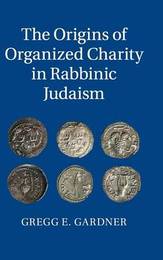
|
The Origins of Organized Charity in Rabbinic Judaism
Hardback
Main Details
| Title |
The Origins of Organized Charity in Rabbinic Judaism
|
| Authors and Contributors |
By (author) Gregg E. Gardner
|
| Physical Properties |
| Format:Hardback | | Pages:252 | | Dimensions(mm): Height 229,Width 152 |
|
| Category/Genre | Judaism |
|---|
| ISBN/Barcode |
9781107095434
|
| Classifications | Dewey:296.3677 |
|---|
| Audience | | Professional & Vocational | |
|---|
|
Publishing Details |
| Publisher |
Cambridge University Press
|
| Imprint |
Cambridge University Press
|
| Publication Date |
4 June 2015 |
| Publication Country |
United Kingdom
|
Description
This book examines the origins of communal and institutional almsgiving in rabbinic Judaism. It undertakes a close reading of foundational rabbinic texts (Mishnah, Tosefta, Tannaitic Midrashim) and places their discourses on organized giving in their second to third century CE contexts. Gregg E. Gardner finds that Tannaim promoted giving through the soup kitchen (tamhui) and charity fund (quppa), which enabled anonymous and collective support for the poor. This protected the dignity of the poor and provided an alternative to begging, which benefited the community as a whole - poor and non-poor alike. By contrast, later Jewish and Christian writings (from the fourth to fifth centuries) would see organized charity as a means to promote their own religious authority. This book contributes to the study of Jews and Judaism, history of religions, biblical studies, and ethics.
Author Biography
Gregg E. Gardner is Assistant Professor and the Diamond Chair in Jewish Law and Ethics at the University of British Columbia. Gardner held a Doctoral Dissertation Completion Fellowship from the Charlotte W. Newcombe Foundation at Princeton University, New Jersey (2008-9). He has also served as a Starr Fellow at the Center for Jewish Studies at Harvard University, Massachusetts (2008-10), a Mellon/American Council of Learned Societies Fellow at the Cogut Center for the Humanities at Brown University, Rhode Island (2010-11), an Early Career Faculty Fellow at the American Academy for Jewish Research (2012-13), a Faculty Associate at the Peter Wall Institute for Advanced Studies (2012-13), and a Mandel Fellow at Brandeis University, Massachusetts (2013-14). Gardner is the co-editor of Antiquity in Antiquity: Jewish and Christian Pasts in the Greco-Roman World (2008). His work has been published or will be published in such journals as the Hebrew Union College Annual, the Jewish Quarterly Review, the Journal for the Study of Judaism, and the Journal of Biblical Literature.
Reviews'This book represents a very fine and fine-grained study of institutional charity in tannaitic literature. Its strengths are its intimate familiarity with the rabbinic primary texts and the secondary literature thereon, the clarity of its structure and argumentation, and its integration of archaeological evidence, Greco-Roman and Christian material, and modern theory. Besides providing a profoundly well-informed overview of the emergence of a set of institutions crucial for the development of Judaism and ultimately of the 'Judeo-Christian' and even 'Abrahamic' traditions, the book marks a genuine advance in our understanding of the historical context for the emergence of the tamhui and the quppa, the differences between these two institutions, and the differences between tannaitic and amoraic approaches to these institutions.' Tzvi Novick, University of Notre Dame, Indiana 'The Origins of Organized Charity in Rabbinic Judaism argues that the early rabbis, the Tannaim, developed a system of organized charity that, while in conversation with their contemporary world, is uniquely their own. Well-written and employing lucid prose, this groundbreaking book unfolds in a cogent, logical order. Gardner interacts with both classic and modern scholarship on rabbinic Judaism. This, of course, is to be expected. What is of most interest is his deft use of modern quotes and theory from other disciplines (anthropology, material culture, social history, and economics), which makes this volume much more usable beyond the audience of a specialist on rabbinic Judaism or ancient Mediterranean religions. This book will appeal both to specialists in any of these fields and to an educated general audience interested in the topic. It will also be suitable for courses on charity and economy in the ancient world or on various rabbinic topics.' Jordan D. Rosenblum, University of Wisconsin, Madison
|